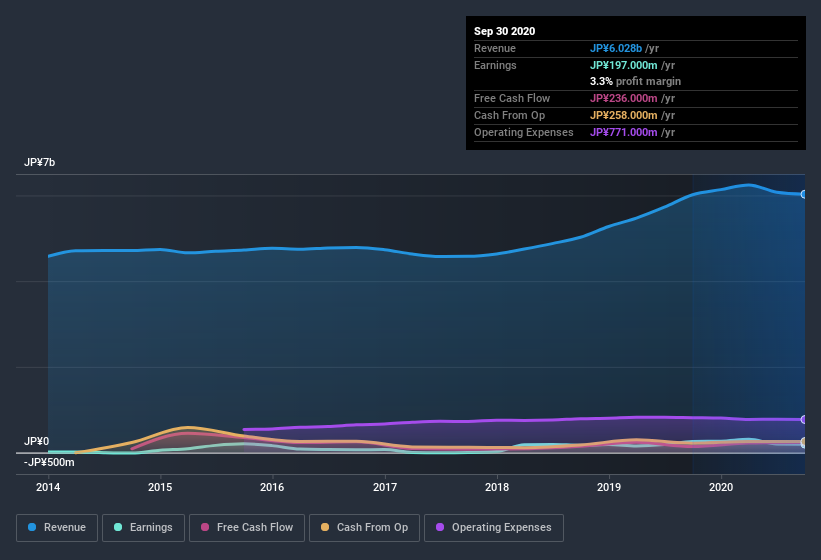Are Japan Third Party's (TYO:2488) Statutory Earnings A Good Reflection Of Its Earnings Potential?
Statistically speaking, it is less risky to invest in profitable companies than in unprofitable ones. Having said that, sometimes statutory profit levels are not a good guide to ongoing profitability, because some short term one-off factor has impacted profit levels. Today we'll focus on whether this year's statutory profits are a good guide to understanding Japan Third Party (TYO:2488).
It's good to see that over the last twelve months Japan Third Party made a profit of JP¥197.0m on revenue of JP¥6.03b. Happily, it has grown both its profit and revenue over the last three years (though we note its profit is down over the last year).
View our latest analysis for Japan Third Party

Not all profits are equal, and we can learn more about the nature of a company's past profitability by diving deeper into the financial statements. In this article we'll look at how Japan Third Party is impacting shareholders by issuing new shares. Note: we always recommend investors check balance sheet strength. Click here to be taken to our balance sheet analysis of Japan Third Party.
To understand the value of a company's earnings growth, it is imperative to consider any dilution of shareholders' interests. As it happens, Japan Third Party issued 9.2% more new shares over the last year. As a result, its net income is now split between a greater number of shares. To talk about net income, without noticing earnings per share, is to be distracted by the big numbers while ignoring the smaller numbers that talk to per share value. Check out Japan Third Party's historical EPS growth by clicking on this link.
A Look At The Impact Of Japan Third Party's Dilution on Its Earnings Per Share (EPS).
As you can see above, Japan Third Party has been growing its net income over the last few years, with an annualized gain of 8,613% over three years. But EPS was only up 8,384% per year, in the exact same period. Net profit actually dropped by 24% in the last year. But the EPS result was even worth, with the company recording a decline of 26%. So you can see that the dilution has had a bit of an impact on shareholders. Therefore, the dilution is having a noteworthy influence on shareholder returns. And so, you can see quite clearly that dilution is influencing shareholder earnings.
If Japan Third Party's EPS can grow over time then that drastically improves the chances of the share price moving in the same direction. But on the other hand, we'd be far less excited to learn profit (but not EPS) was improving. For that reason, you could say that EPS is more important that net income in the long run, assuming the goal is to assess whether a company's share price might grow.
Our Take On Japan Third Party's Profit Performance
Over the last year Japan Third Party issued new shares and so, there's a noteworthy divergence between EPS and net income growth. Therefore, it seems possible to us that Japan Third Party's true underlying earnings power is actually less than its statutory profit. But on the bright side, its earnings per share have grown at an extremely impressive rate over the last three years. At the end of the day, it's essential to consider more than just the factors above, if you want to understand the company properly. With this in mind, we wouldn't consider investing in a stock unless we had a thorough understanding of the risks. For example, we've discovered 3 warning signs that you should run your eye over to get a better picture of Japan Third Party.
This note has only looked at a single factor that sheds light on the nature of Japan Third Party's profit. But there are plenty of other ways to inform your opinion of a company. For example, many people consider a high return on equity as an indication of favorable business economics, while others like to 'follow the money' and search out stocks that insiders are buying. While it might take a little research on your behalf, you may find this free collection of companies boasting high return on equity, or this list of stocks that insiders are buying to be useful.
If you’re looking to trade Japan Third Party, open an account with the lowest-cost* platform trusted by professionals, Interactive Brokers. Their clients from over 200 countries and territories trade stocks, options, futures, forex, bonds and funds worldwide from a single integrated account. Promoted
New: Manage All Your Stock Portfolios in One Place
We've created the ultimate portfolio companion for stock investors, and it's free.
• Connect an unlimited number of Portfolios and see your total in one currency
• Be alerted to new Warning Signs or Risks via email or mobile
• Track the Fair Value of your stocks
This article by Simply Wall St is general in nature. It does not constitute a recommendation to buy or sell any stock, and does not take account of your objectives, or your financial situation. We aim to bring you long-term focused analysis driven by fundamental data. Note that our analysis may not factor in the latest price-sensitive company announcements or qualitative material. Simply Wall St has no position in any stocks mentioned.
*Interactive Brokers Rated Lowest Cost Broker by StockBrokers.com Annual Online Review 2020
Have feedback on this article? Concerned about the content? Get in touch with us directly. Alternatively, email editorial-team@simplywallst.com.
About TSE:2488
JTPLtd
Provides outsourced technical services to technology companies in Japan.
Low risk unattractive dividend payer.
Market Insights
Community Narratives




